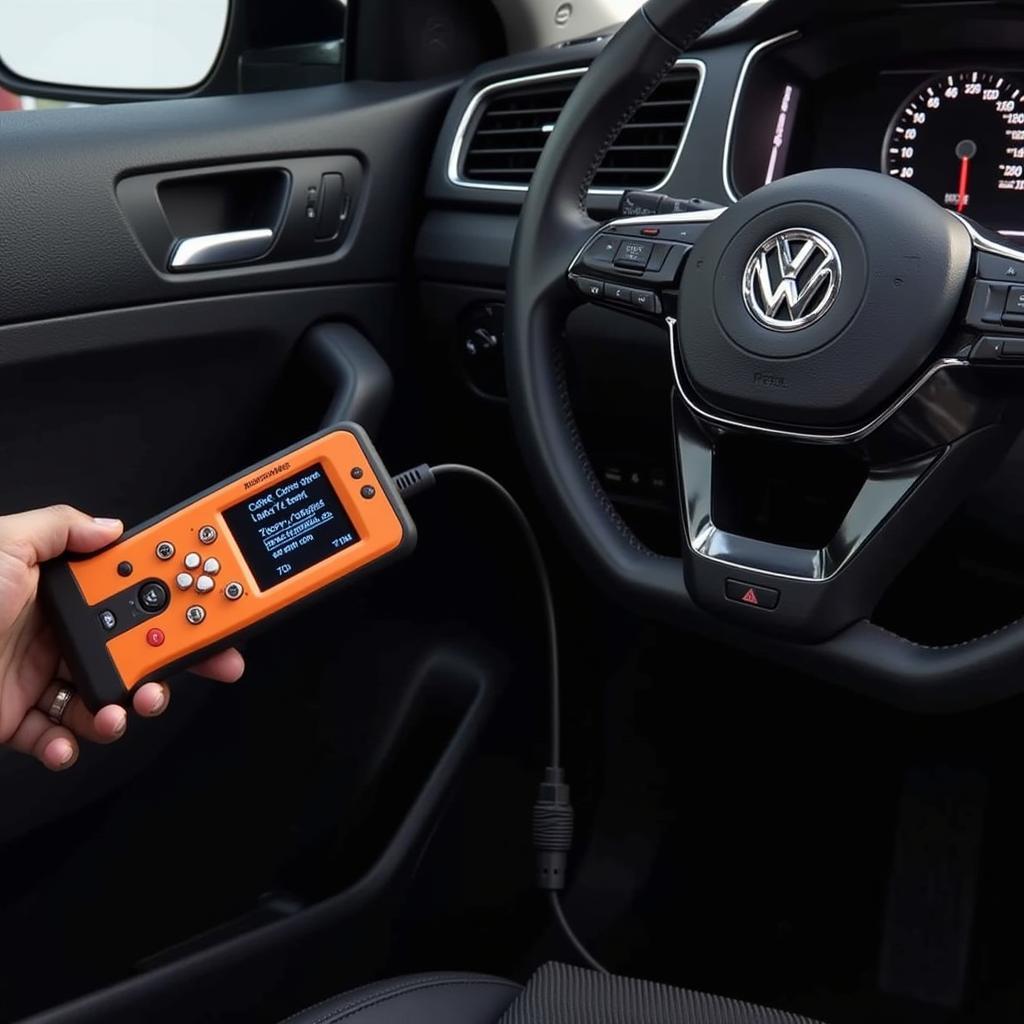Your cart is currently empty!

2013 VW Jetta Engine Knock Multiple Codes: A Comprehensive Guide
A knocking engine in your 2013 VW Jetta coupled with multiple diagnostic trouble codes (DTCs) can be a frustrating experience. This guide will help you understand the potential causes, diagnostic procedures, and solutions for a 2013 VW Jetta engine knock accompanied by multiple codes. We’ll explore everything from common culprits like faulty sensors and worn engine components to more complex issues.
Understanding Engine Knock and Diagnostic Codes in a 2013 VW Jetta
Engine knock, often described as a pinging or rattling sound, typically indicates abnormal combustion within the engine cylinders. Multiple diagnostic trouble codes further complicate the diagnosis, as they can point to various interconnected systems. Understanding the relationship between these codes and the knocking sound is crucial for effective troubleshooting.
Common Causes of Engine Knock and Multiple Codes
Several factors can contribute to engine knock and trigger multiple DTCs in your 2013 VW Jetta. These include:
- Faulty Knock Sensor: A malfunctioning knock sensor can misinterpret normal engine vibrations as knock, leading to inaccurate readings and the illumination of the check engine light.
- Low-Quality Fuel: Using low-octane fuel or fuel contaminated with water or other impurities can cause pre-ignition and detonation, resulting in engine knock.
- Carbon Buildup: Excessive carbon deposits in the combustion chamber can increase compression and promote pre-ignition, contributing to knocking.
- Worn Spark Plugs: Worn or fouled spark plugs can disrupt the combustion process, potentially causing engine knock and triggering misfire codes.
- Timing Issues: Incorrect ignition timing can lead to inefficient combustion and engine knock. This can also trigger related DTCs.
- Lean Air/Fuel Mixture: A lean air/fuel mixture can cause excessive heat and detonation, resulting in knocking and potentially damaging engine components.
Diagnosing Engine Knock and Multiple Codes in a 2013 VW Jetta
Diagnosing the root cause of engine knock and multiple codes requires a systematic approach:
-
Retrieve Diagnostic Trouble Codes (DTCs): Use an OBD-II scanner to retrieve all stored DTCs. Note down the specific codes for further analysis.
-
Inspect the Knock Sensor: Visually inspect the knock sensor for any signs of damage or loose connections. Test the sensor’s resistance using a multimeter.
-
Check Fuel Quality: Ensure you are using the recommended octane fuel. Consider draining and refilling the fuel tank if contamination is suspected.
-
Inspect Spark Plugs: Remove and inspect the spark plugs for wear, fouling, or damage. Replace them if necessary.
-
Check Ignition Timing: Verify the ignition timing is within the manufacturer’s specifications.
-
Inspect for Vacuum Leaks: Check for any vacuum leaks in the intake system, as these can affect the air/fuel mixture.
Solving the Engine Knock and Multiple Codes Issue
Once you have identified the underlying cause, you can implement the appropriate solution. This might involve:
- Replacing the Knock Sensor: If the knock sensor is faulty, replace it with a new OEM or equivalent sensor.
- Using High-Quality Fuel: Switch to the recommended octane fuel and avoid using fuel from questionable sources.
- Performing a Carbon Cleaning: A professional carbon cleaning service can remove excessive carbon deposits from the combustion chamber.
- Replacing Spark Plugs: Replace worn or damaged spark plugs with new ones.
- Adjusting Ignition Timing: Correct any discrepancies in the ignition timing.
- Repairing Vacuum Leaks: Repair or replace any components causing vacuum leaks.
“Accurate diagnosis is key when dealing with engine knock and multiple codes. A thorough inspection and systematic testing will save you time and money in the long run.” – John Miller, ASE Certified Master Technician
2013 VW Jetta Engine Knock Multiple Codes: FAQs
- What does a knocking engine sound like? It typically sounds like a metallic pinging or rattling coming from the engine, especially under load or acceleration.
- Can bad gas cause engine knock? Yes, low-quality fuel or contaminated fuel can cause pre-ignition and detonation, leading to engine knock.
- How much does it cost to fix engine knock? The cost depends on the underlying cause. It can range from a simple spark plug replacement to more expensive repairs like engine rebuilds.
 Using an OBD-II Scanner on a 2013 VW Jetta
Using an OBD-II Scanner on a 2013 VW Jetta
- Can I drive my car with engine knock? While you might be able to drive short distances, persistent engine knock can cause serious engine damage. It’s best to address the issue promptly.
- What are the most common codes associated with engine knock? Codes related to misfires, knock sensor malfunctions, and fuel system issues are often associated with engine knock.
- How do I prevent engine knock? Regular maintenance, using high-quality fuel, and addressing any engine issues promptly can help prevent engine knock.
- Why do I have multiple codes along with the engine knock? Multiple codes often indicate interconnected systems or cascading failures, where one problem triggers others.
Conclusion
Addressing a 2013 VW Jetta engine knock with multiple codes requires careful diagnosis and appropriate repairs. By understanding the potential causes and following the diagnostic procedures outlined in this guide, you can effectively resolve the issue and restore your vehicle’s performance. If you need professional assistance, contact VCDSTOOL at +1 (641) 206-8880 and our email address: vcdstool@gmail.com or visit our office at 6719 W 70th Ave, Arvada, CO 80003, USA. We’re here to help you get back on the road!
by
Tags:
Leave a Reply